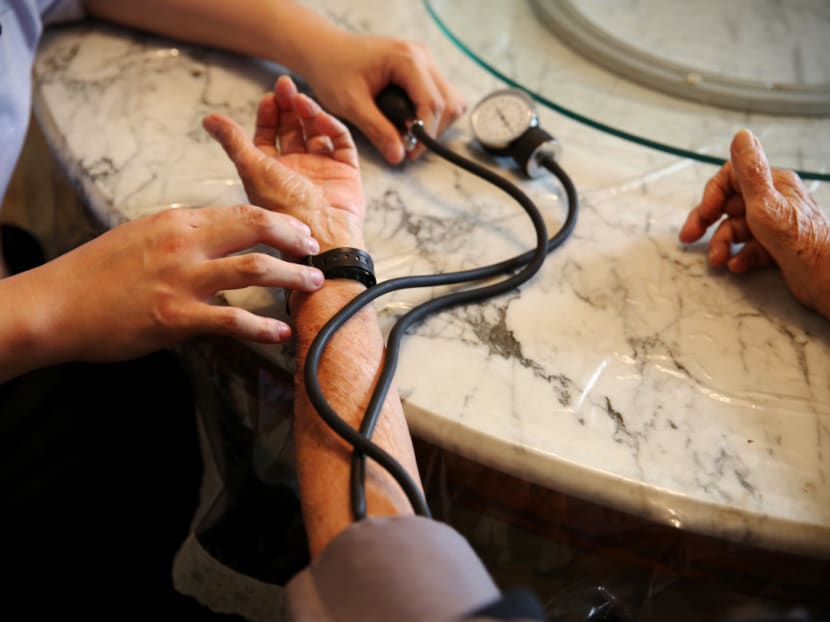New committee looking into long shifts, working conditions of junior doctors
SINGAPORE — A "national wellness committee" has been formed to look into issues such as the working hours and conditions of junior doctors, who have to pull long overnight shifts that are among various factors taking a toll on their well-being.

- A committee has been set up to look into issues such as the working hours and working conditions of junior doctors.
- A tripartite workgroup will look into the abuse and harassment of healthcare workers, after a rise in such cases over the past few years
- Dr Koh Poh Koon, Senior Minister of State for Health, said that one specific group of healthcare workers that is of concern is junior doctors who have to do long shifts on night calls
- Surveys have shown that 20 per cent of junior doctors exceeded their 80-hour work week
SINGAPORE — A "national wellness committee" has been formed to look into issues such as the working hours and conditions of junior doctors, who have to pull long overnight shifts that are among various factors taking a toll on their well-being.
Dr Koh Poh Koon, Senior Minister of State for Health, said on Wednesday (March 9) that the committee, set up last December, is exploring the viability of different call systems while ensuring that training requirements are not compromised and looking into ways to support the mental wellness of junior doctors.
Speaking during the debate on the spending plans of the Ministry of Health (MOH), Dr Koh added that a tripartite workgroup that will look into the abuse and harassment of healthcare workers.
This workgroup will spearhead a national effort to prevent the abuse and harassment of healthcare workers in the public, private and community care sectors following a rise in the number of such cases over the past few years.
In January, Health Minister Ong Ye Kung said in a written parliamentary reply to a question that there had been about 1,400 abuse and harassment cases against healthcare workers reported as of the end of November 2021.
This was up from 1,300 cases in 2020, 1,200 cases in 2019 and 1,080 cases in 2018.
Dr Koh noted that this rise in cases has occurred in spite of public healthcare workers coming under enhanced protection under the Protection Against Harassment Act.
In cases of abuse and harassment, many healthcare workers may hesitate to make official complaints and police reports out of empathy, he added.
“However, their compassion should not be misconstrued as an acceptance of abuse or harassment. We need to make sure that our healthcare workers feel safe in their work environment.”
The tripartite workgroup will thus look into raising public awareness of what constitutes abuse and harassment of healthcare workers, among others.
JUNIOR DOCTORS A GROUP OF CONCERN
Dr Koh on Wednesday also noted that one specific group of healthcare workers that is of concern is junior doctors, who have to do long shifts on night calls.
The Singapore Medical Council guidelines stipulate that junior doctors may work up to 80 hours a week. Included in this is the time spent on overnight duties — 24-hour shifts that effectively last 30 hours or more before duties are handed over the next day.
However, surveys have shown that 20 per cent of junior doctors exceeded this 80-hour work week.
“This could be due to the nature of clinical work in certain departments or exigencies of service,” Dr Koh said.
He also noted proposals such as “night float systems”, where doctors take turns to work the night shifts for a few days at a stretch without covering the daytime work.
This means that junior doctors work a shorter 12-hour night shift instead of the traditional 30-hour call.
Dr Koh said that this can allow doctors to start their night shifts with a full day’s rest, though the possible trade-off includes more handover exchanges between team members and possibly a reduced learning experience since they may not follow through with patients’ entire care process.
He added that this system had been tried in two large departments but was curtailed by Covid-19. When the Covid-19 situation allows, the plan is to try this in smaller departments.
“As we look at the issue of work hours, let us not lose sight of these important considerations, which are inherent in the nature of our work as doctors," he said. "With shorter working hours a week, a junior doctor may have to undergo a longer apprenticeship to acquire the necessary competencies.”
Dr Koh added that the Government recognises that the workload and the nature of clinical work today is different from that of yesteryear, with an ageing population that has a higher prevalence of chronic diseases and higher expectations of more consultative care.
He also cautioned that a “simplistic framing” of the issue as one about just work hours is not diagnosing the root cause of the problem, because the stressors faced by junior doctors are symptomatic of a broader shift in care delivery arrangements.
“Whether it is 24-hour or 30-hour shifts, what is clear is that we should not stretch our junior doctors beyond what is physiologically possible and risk compromising patient safety.”
Noting concerns among Members of Parliament about turnover in the healthcare workforce, Dr Koh reiterated that the average attrition rate of doctors and nurses from public acute hospitals in the last two years was comparable with that in 2019.
But this does not mean these concerns of attrition should be dismissed, he said, adding that more needs to be done to tackle the healthcare sector's growing manpower needs.











